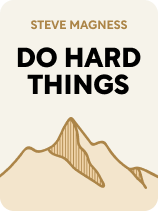

This article is an excerpt from the Shortform book guide to "Do Hard Things" by Steve Magness. Shortform has the world's best summaries and analyses of books you should be reading.
Like this article? Sign up for a free trial here.
Do you often get disappointed by unexpected outcomes? How do you set realistic expectations?
Having high expectations can be helpful, especially if you have big goals you want to achieve. But sometimes things don’t go as planned. That’s why it’s best to have realistic expectations to not get too excited.
Here’s how to set realistic expectations to keep yourself on track, according to Steve Magness’s book Do Hard Things.
Set Realistic Expectations
The key to facing reality lies in learning how to have realistic expectations, claims Magness. During a difficult task, our brains are constantly calculating whether things are going better or worse than expected. When they’re going as expected, or better than expected, it’s easy to stay motivated and positive because it’s all going according to plan. If things are harder than expected, you’re more likely to have negative thoughts and feelings that spiral and cause you to give up or panic.
(Shortform note: In Becoming Bulletproof, former secret-service agent Evy Poumpouras echoes Magness’ argument, saying that setting realistic expectations is a crucial part of being a resilient person. Poumpouras argues, however, that to set accurate expectations, you should balance optimism with a realistic perspective. It’s important to retain a certain degree of optimism because this allows you to constructively face adversity. But you can also be too optimistic, which causes you to overlook potential problems and thus makes it more difficult to deal with them when they occur.)
Setting realistic expectations lets you see a stressful situation as a challenge rather than as a danger. If you see a stressor as a challenge, you’re more likely to stay calm, accurately evaluate the situation, and accomplish the task at hand. However, if you see a stressor as dangerous, you’re more likely to give up—your body is simply trying to get out of that situation.
(Shortform note: In Psycho-Cybernetics, Maxwell Maltz provides some tips on how to frame a stressful or anxiety-inducing situation as a challenge or an opportunity. Maltz claims that many people avoid opportunities for growth because they perceive challenges to be bigger threats than they actually are. The key to persisting, according to Maltz, is to stay relaxed. You can practice staying relaxed through visualization techniques—while in a relaxing environment, try to imagine what could go wrong in a stressful situation and how you would respond to it. This way, if your worst fears are realized and the situation does go awry, you’ll have already mentally prepared for it.)
Magness provides some strategies on how to set realistic expectations in your life:
Set realistic goals: When setting personal goals, people are often told to go big, which leads them to set goals that are unrealistic. When it becomes apparent that the goal you set isn’t achievable, you’ll likely give up. Instead, set goals that are achievable, or perhaps just beyond what you think you’re capable of. That way, you can push yourself to your limits instead of beyond them.
| The Science of Goal-Setting The idea that you should set audacious, out-of-reach goals is indeed pervasive in modern culture. For example, in The 10X Rule, Grant Cardone argues that you should set goals that are 10 times bigger than the average goal. In The Obstacle Is the Way, Ryan Holiday argues that you should set unrealistically high goals. Such arguments are founded on the belief that the only way to achieve great things is to set goals that go far beyond what you think you’re capable of. But research confirms Magness’s claim that when setting personal goals you should keep them realistic. By measuring systolic blood pressure (SBP), which indicates how prepared your body is to act, researchers found that setting easy-to-achieve goals results in a small spike in SBP, setting moderate-to-hard goals results in a larger spike in SBP, and setting impossible goals results in a decrease in SBP. In other words, setting moderately challenging goals is the best way to shift your body into a state of readiness for action and stay motivated. |
Set goals that align with your values: Setting realistic expectations isn’t just about your capabilities: It’s also about your needs and wants. Magness contends that it’s important to set goals you actually want to achieve, not goals that you want to achieve for external reasons (for example, goals you believe others want you to accomplish, or goals you feel you should accomplish in order to fit into society’s view of success).
(Shortform note: Psychologists provide some tips on how to set goals that align with your values. When setting personal goals, ask yourself the following questions: Why is the goal meaningful to you? How will achieving this goal help you, and how will this make you feel? You can also make a list of values that are most important to you. Whenever you set a goal, ask yourself whether it aligns with your personal values.)
Focus on the journey: If you define success based solely on outcomes, Magness says you’re more likely to kill your motivation—if you don’t get the outcome you expected, you’ll be more likely to give up. Instead, define success by how you executed your plan or how much effort you put in.
(Shortform note: In Ego Is the Enemy, Ryan Holiday provides another reason why focusing on the journey is important. He explains that often, focusing on the outcomes of your work is just a way to stroke your ego (for example, you might want to nail a presentation because of the praise your boss will give you). But if you define success by how much recognition or external reward you get, you set yourself up for failure because when things don’t go your way, the lack of recognition or external success might make you angry or bitter.)

———End of Preview———
Like what you just read? Read the rest of the world's best book summary and analysis of Steve Magness's "Do Hard Things" at Shortform.
Here's what you'll find in our full Do Hard Things summary:
- Why the "old-school" way we think about toughness is wrong
- Why machismo ideals are harmful and ineffective
- How to become resilient and versatile, and how to overcome adversity






